- Home
- Steve Hockensmith
Pride and Prejudice and Zombies: Dawn of the Dreadfuls papaz-1 Page 4
Pride and Prejudice and Zombies: Dawn of the Dreadfuls papaz-1 Read online
Page 4
Then, the panorama prepared, they waited.
And waited.
And waited.
Lord Lumpley’s note said he’d arrive at three, rather late in the day for a call, but allowances were made for an aristocrat. Or would be if one ever showed up.
By four, Jane was more tranquil even than usual, for, wearied by the day’s training, she’d fallen fast asleep.
By four thirty, Kitty and Lydia’s constant sniggering and sauciness had frayed Mary’s nerves to the breaking point, and she threatened to use her knitting needles in a most unsisterly fashion.
By five, Mrs. Bennet was ranting that Lord Lumpley probably wasn’t coming at all, having heard (she conjectured—loudly) that the girls had taken to beating each other with sticks under the direction of their deranged father.
And at precisely five fourteen, Mr. Bennet came in and told his wife to hold her tongue, if that were possible without causing herself grievous injury. The baron’s carriage was pulling up out front.
“Well, don’t just sit there!” Mrs. Bennet cried, shooing her daughters from the spots that she herself had cemented them in nearly two hours before. “Come and greet His Lordship!”
Mr. Bennet blocked the door. “For Heaven’s sake, he’s a baron, not the king. Keep your seats, all of you. I’ll bring him in once we’ve had our talk.”
Lord Lumpley’s proximity actually made Mrs. Bennet worse, and she spent the next half hour telling her daughters not to fidget while doing that very thing to such an extent she appeared to be having some sort of seizure. She blinked, she tapped her feet, she jumped at every step in the hall, she squirmed, she coughed. The only symptom absent was frothing at the mouth.
Kitty and Lydia found it endlessly comical, Mary asked if she should run upstairs and fetch the laudanum, and Jane simply weathered it with quiet, forlorn fortitude.
Elizabeth, meanwhile, attempted to preserve her peace of mind with a concentration aid her father had spoken of that afternoon: a mantra, he’d called it.
Smooth stone beneath still water, Elizabeth said to herself. Smooth stone, still water, smooth stone, still water, smooth EGAD HOW I WANT TO THROTTLE THAT WOMAN!
At long last, her mother could take the suspense no longer, and she sprang from the chaise longue she’d been in danger of fainting upon and blurted out, “I swear, if His Lordship isn’t in here in the next ten seconds, I’m going to drag him in by the ear like the naughty little boy he is!”
It was at this precise moment, of course, that the door to the drawing room opened and a half-amused, half-mortified Mr. Bennet stepped in to announce their guest, the Baron of Lumpley.
“Oh, My Lord!” Mrs. Bennet said, and it was unclear to all whether she was blaspheming or offering a greeting.
“Oh, My Lady,” Lord Lumpley said with an elegantly arched eyebrow, and he slid smoothly across the room to press his lips to her trembling fingers. He was long accustomed to the awe he could inspire, no doubt, and he seemed to relish a fresh opportunity to be magnanimous about it.
Elizabeth fancied the man brought a whiff of sulphur in with him, though more likely his dressers had simply gone a little heavy on the eau de cologne. Certainly, they had labored long over him, for his girth—and he had plenty of it—had been packed into a black suit that, though beautifully cut, appeared to be on the verge of bursting at the seams any second. Around his neck, tied high enough to hide some if not all of his jowls, was an extravagant cravat such as to make Beau Brummell blush.
“My daughters,” Mr. Bennet said, preparing to make introductions.
“Oh, I remember them well, Sir. The beautiful Jane and Elizabeth and . . .” The baron flicked his gaze quickly over the younger girls. “Myrtle and the rest.” He resettled his stare on Jane. Jane alone. “It is a pleasure to be in your company again. I have so longed to see more of you.”
Jane attempted to deflect his attentions with averted eyes and a small, demure smile, as it was not in her nature to be so flirtatious or brazen.
Elizabeth, on the other hand, was of a very different inclination: one the day’s training had, somehow, tilted her toward all the more. She was readying what she considered a suitable reply, but only got as far as a sardonically cocked eyebrow when her mother spoke first.
“But His Lordship needs a place to sit! Lizzy, why don’t you come over here next to me?”
“Oh, I would not dream of evicting a young lady from her seat,” Lord Lumpley said.
He and Mrs. Bennet then waited for Elizabeth to make the appropriate reply: “It is no inconvenience, Sir. Pray, do sit.”
“Thank you,” she said instead, making no move to leave her place by Jane’s side.
Mrs. Bennet scowled at her behind the baron’s back, then turned and shooed “Myrtle” from her plush wing chair.
“But he said—,” Mary began.
“Come and sit with your beloved mother!” Mrs. Bennet snapped.
Mary slouched over and slumped down beside Mrs. Bennet, while Lord Lumpley, with no more thanks to her than a silent nod, settled himself in her spot. He was only a few feet from Kitty and Lydia now, and when he noticed them admiring him, wide eyed, he flashed them a devilish grin that had both hiding behind their hands, giggling madly.
Mrs. Bennet cleared her throat and began conversation in the approved manner: with the most boring topic imaginable.
“It is quite an uncommonly warm spring we’re having, is it not?”
Lord Lumpley acknowledged the comment with a benevolent nod. “It is indeed.”
“Do you think that’s why the unmentionables are back?” Mary asked.
Mrs. Bennet started as if she’d been pinched. Then Mary did the same—because she had been pinched.
“They’re called unmentionables for a reason, my dear,” Mrs. Bennet said.
“But it’s what he came here to talk about, isn’t it?”
“Not . . . to . . . us.”
“It’s quite all right, Mrs. Bennet,” Lord Lumpley said. “I don’t mind addressing the subject, now that it’s been broached. It’s quite natural, I suppose, that it should be foremost on everyone’s minds.”
He looked over at Mary, opened his mouth to speak—then abruptly lost interest in her and turned to Jane, instead.
As far as Elizabeth was concerned, there could be no question what was foremost on his mind.
“Your father and I have had the most productive conversation on the matter, and tomorrow steps will be taken to ensure the safety of all. As for why Mr. Ford should have succumbed to the plague now, when it hasn’t been seen in these parts for so long, I cannot say. I will venture, however, that one unmentionable does not a plague make. There have been isolated incidents in the past. I see no reason why this wouldn’t merely be another.”
“Isolated incidents?” Elizabeth asked. She looked over at her father, who was still standing just inside the doorway.
He gave his head the smallest of shakes.
“But we do not know there are not others,” Jane said softly. “There is, for instance, a girl who disappeared from Meryton but two weeks ago. Emily Ward. Would that not suggest that the menace wasn’t limited to Mr. Ford?”
The baron put on a condescending smile. “I hope you’ll forgive me for being frank, but the young lady’s ‘disappearance’ is nothing new. It rather happens on a regular basis, and has more to do with coxcombs bound for Scotland than the supernatural. And even if unmentionables were to blame, perish the thought, remember we are speaking of a lone girl . . . and next the filthy rotters will be facing men. Trust me, dear lady: If—and I say again if!—there are more dreadfuls in Hertfordshire, they will be dealt with handily.”
As the nobleman blathered away, Elizabeth kept her eyes on her father, gauging his reaction. Though Mr. Bennet was usually a master of droll dispassion, Elizabeth detected a seething uneasiness beneath his cultivated blankness. Before she could stop herself, she found herself giving voice to the words she guessed he was thinking.
&nbs
p; “So you had dealings with zombies during The Troubles, then?”
Lord Lumpley, Mrs. Bennet, and even Jane flinched. The Zed Word wasn’t supposed to be spoken in polite company.
The baron took a moment to compose himself before making his reply.
“I am but six-and-twenty years of age, so obviously I took part in no battle lo those many years ago. Yet I have faced the creatures. Before they became extinct—if something already dead can be said to do so!—my father used to import some from the north for the shooting season. Pathetic, shambling things, they were. It didn’t even make for good sport.”
“I would guess it is a bit more sporting, My Lord, if they outnumber you and there are no shotguns at hand,” Elizabeth said. “Would you not agree, Father?”
“I might choose a word other than sporting,” Mr. Bennet replied.
“Papa saw a zombie eat a Scotsman once!” Lydia threw in, oblivious, as always, to subtext and nuance in conversation or anything else. “Mary told me he said . . . what?”
She glared over at Kitty, who, ever her mother’s daughter, was delivering a vicious pinch under the table.
“I’m sure His Lordship doesn’t want to hear about that,” Kitty said. “Particularly from you.”
Then she turned back to the baron, hacked out what she took to be a decorous little cough, and didn’t so much steer the conversation back to safer territory as pick it up and hurl it there.
“My, but the sun was strong today. Can you believe it’s only April?”
For the next eternity or so, by Elizabeth’s reckoning, the conversation limped along this line of thought very much like a zombie: lifeless and mindless and making a jelly of whatever healthy brains were within its reach. So oppressive did talk of the weather eventually become, Elizabeth very nearly offered to fetch a barometer and an almanac so the amateur meteorologists in the room could make a real study of it.
Her father finally put the conversation out of its (and Elizabeth’s) misery.
“I do not wish to be rude, Sir, but I feel it my duty to point out the time. Soon enough, the roads of Hertfordshire might not be safe even in the daytime. At night, I fear, you already risk disaster.”
Lord Lumpley’s fleshy face went grave as he tore his gaze away from Jane (whom he’d been staring at without stop even though she, like Elizabeth, had been weathering the weather talk without adding a word to it).
“Your concern does you credit, Mr. Bennet. If only other responsibilities had not delayed me so long in reaching your door this evening.” The baron turned toward the nearest window, and his lip curled ever so slightly—either a show of dread as day turned to dusk outside or distaste for the iron bars Mr. Bennet had insisted the servants put up the day before. “Yes, perhaps I should go . . . though if it’s as dangerous as you say, I wonder if I should risk the trip at all.”
And immediately, Elizabeth knew. The young nobleman had arrived late intentionally. He’d been fishing for an invitation to stay all along. He meant to sleep in their home! Or claim a bed in it, at any rate.
The young nobleman had a reputation for taking liberties, one Jane refused to give credence to, so without guile or distrust was she. But it was plain to Elizabeth he’d earned his reputation. And sought to do so again.
Mrs. Bennet seemed to see it all, as well—or at least that part of the picture that suited her. She perked up and leaned forward, eyes wide with delight.
Mr. Bennet was just the opposite: still, stone faced, inscrutable. It was a race to see who would speak first.
For once (and to Elizabeth’s infinite relief), Mr. Bennet won.
“I think you need not worry, My Lord, assuming you don’t allow us to detain you any further. After all, it is well established that you have the fastest carriage in the county. No doubt you could easily outpace any stiff-legged unfortunates we might have lumbering about—so long as you still have a few rays of light to steer by. And I’m sure you’re anxious to begin the preparations we spoke of earlier, as well. You have many messages to dispatch, come morning—for which I again thank you. How lucky we are to have a young man as energetic and fearless as you to spearhead these vital efforts for us.”
The baron’s already ruddy face went a shade rosier. Mr. Bennet had assigned him a role—the courageous man of action—and he had no choice but to play it.
He cleared his throat and got to his feet. “Yes, well . . . a man does what he must. Even more so when he has rank and responsibility.”
Mr. Bennet nodded solemnly.
Mrs. Bennet looked like she’d have used the Fulcrum of Doom on him, if only she knew how.
Before leaving, Lord Lumpley recovered enough to step to the divan and take Jane’s hand in his. He lingered over it at such length and with such obvious longing Elizabeth began to wonder whether he was going to kiss it or eat it.
“I will see you at the ball at Pulvis Lodge, I presume?”
Jane nodded. “I will be there.”
“Excellent. I ask now for the first dance. And the last. And as many in between as you might spare.”
Though it was Jane’s fingers he finally kissed, it was Mrs. Bennet who was on the brink of swooning.
“The least you could’ve done was invite him to stay to supper,” she snipped at her husband when he returned to the drawing room a short while later, having seen the baron on his way. “Didn’t you notice how he fawns over Jane?”
“A syphilitic bat could’ve seen it.”
“Oh! Mr. Bennet! Really!”
“I’m sorry, Mrs. Bennet. I misspoke.” Mr. Bennet dropped wearily into the very chair their guest had warmed with his well-padded hindquarters. “I meant to say, ‘Yes. I noticed.’”
“Well, didn’t it occur to you to capitalize on that?”
Mr. Bennet didn’t speak to her or look at her. Instead, he turned a wistful, almost remorseful gaze on Jane.
Somehow, Elizabeth got the feeling he already was capitalizing on the baron’s infatuation—and already regretting it, as well.
CHAPTER 8
WHEN RICHARD George Saunders-Castleton Harper-Milford Norman-Stilton-Harrowby Lumpley II, sixth Baron of Lumpley, knight of the Bath, and defender of the realm, awoke the next morning, the first thing he did was kick the empty gin bottles from his bed. Then he kicked off the dogs. And last (and with some regret) he kicked out the chambermaids.
He had things to do this day. Important matters that demanded his attention.
He needed a new truss, and only the best would do.
He stood and admired himself in the full-length mirror strategically placed near the bed. True, his manly pear-shaped form had been swelling of late—it was now more like a gourd mounted on the twin stickpins of his legs. But, oh, his regal brow! His piercing eyes! His lordly chins! His soft, pale, pillowy arms unsullied by sinew or muscle! It was, in all respects, not just his mirror image he beheld, but that of his friend and fellow master of the bacchanal arts, the Prince Regent.
What woman could resist such a man? What female—be she girl, matron, or crone—would not fling aside her dignity and self-respect like so many hastily discarded underthings at his first wink? What delicate beauty could he not gently coax into his tender embrace . . . and then give the old how’s your father?
Well, there might be one: fair Jane of the golden hair and the milk-white skin and the inviting décolletage and the horrid, horrid family. But he had reason to hope her virtue wasn’t long for this earth.
And then the Baron of Lumpley groaned, for he remembered at last that he had work to do. Actual work! Damn the incessant burdens of noblesse oblige.
Without dressing (how could he without the usual retinue of six to help him?) he walked to the study and wrote the following note:
Hunt today—3 o’clock—come!
L.
Then he rang the bell and sat back, wrist aching from the strain of unaccustomed toil, and waited for his man Belgrave.
“My Lord?” Belgrave said blandly when he walked in a m
oment later. He was a studiously stoic little fellow of forty-and-some years with gray at his temples and a pale gray complexion and a gray, gray soul. If he noticed that his employer was lolling about without a stitch on, he didn’t show it. He never seemed to notice anything, which was one of the reasons Lord Lumpley depended on him so. As a test, the baron had once strutted around an entire morning with half an apple clinched between his naked cheeks, and when at last Belgrave commented upon it, it was only to say, “Pardon me, My Lord, but you seem to have bruised your fruit. Shall I fetch something fresh?”
“Take this.” Lord Lumpley held out the note. “Make copies, stamp them with my seal, and have them dispatched immediately to . . . oh . . . everyone.”
“Everyone, My Lord?”
“Everyone within a twenty-mile radius.”
“Everyone within a twenty-mile radius, My Lord?”
The baron heaved a sigh. Work, work, work!
“Everyone who matters.”
“Ahhhh.” Belgrave nodded. “The gentlemen of the area.”
“Yes, yes. The usual bunch, you know who. Oh, and alert the Master of the Quorn. I’ll be needing all his dogs this afternoon. We’re to have one more hunt before The Season!”
“Very good, My Lord.”
Belgrave began backing toward the door.
Lord Lumley cleared his throat.
“Tell me, Belgrave . . . what do you think of my riding attire?”
Belgrave regarded the baron with cool, pale blue eyes that never blinked. Ever.
“His Lordship is, as always, the very picture of virile English manhood. Though I might point out that the traditional color for the hunt is red.”
“Ahhh, right you are, Belgrave. Make it so.”
A few minutes later, the baron’s dressing team arrived to begin stuffing him into his clothes. As the sockman worked on his left foot and the drawersman fussed over the fit of his trousers and the trussmen strained to stitch him up from behind in his fraying, crack-ribbed girdle, Lord Lumpley set his mind to the hunt.

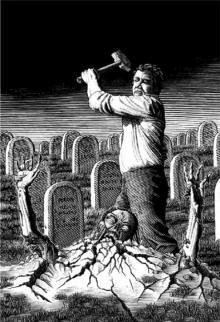 Dawn of the Dreadfuls
Dawn of the Dreadfuls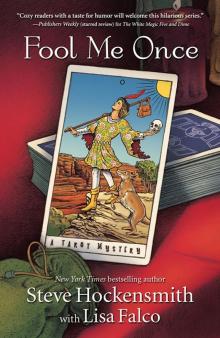 Fool Me Once: A Tarot Mystery
Fool Me Once: A Tarot Mystery The Hungry
The Hungry Naughty: Nine Tales of Christmas Crime
Naughty: Nine Tales of Christmas Crime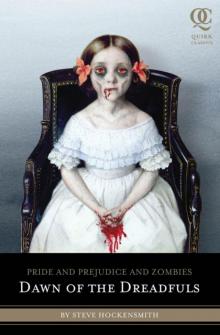 Pride and Prejudice and Zombies: Dawn of the Dreadfuls papaz-1
Pride and Prejudice and Zombies: Dawn of the Dreadfuls papaz-1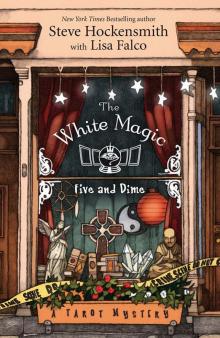 The White Magic Five & Dime (A Tarot Mystery)
The White Magic Five & Dime (A Tarot Mystery)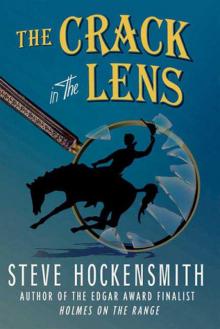 The Crack in the Lens
The Crack in the Lens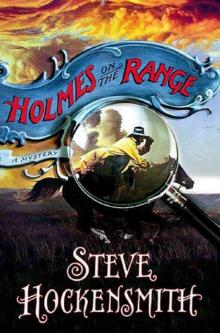 Holmes on the Range
Holmes on the Range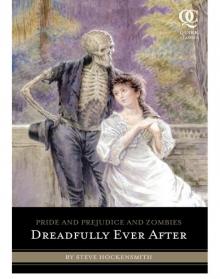 Dreadfully Ever After
Dreadfully Ever After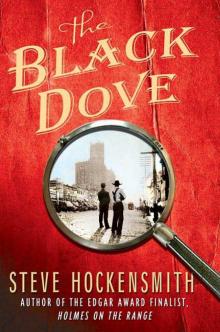 S Hockensmith - H03 - The Black Dove
S Hockensmith - H03 - The Black Dove On the Wrong Track
On the Wrong Track Naughty-Nine Tales of Christmas
Naughty-Nine Tales of Christmas World's Greatest Sleuth!
World's Greatest Sleuth!